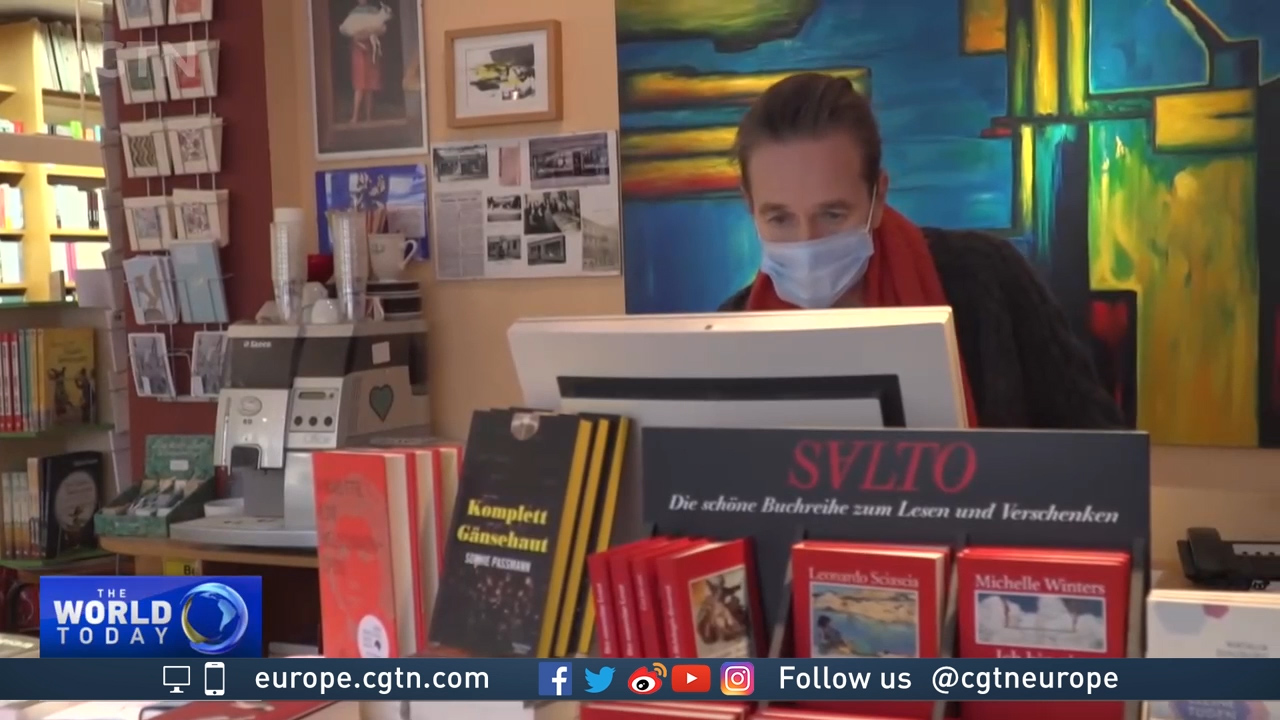
German Chancellor Angela Merkel and the heads of the country's 16 states have agreed to a gradual easing of lockdown measures. /Martin Meissner/AP
German Chancellor Angela Merkel and the heads of the country's 16 states have agreed to a gradual easing of lockdown measures. /Martin Meissner/AP
Ruth Cyranka meticulously positions each book along the spine of the next.
"The shop is full," she excitedly tells CGTN Europe as she adds the final touches to the display in her bookstore, which will be allowed to open its doors again on Monday.
"We had to close in mid-December, which means we lost eight days of the Christmas business. That is of course serious," she says.
But closures went on far beyond the Christmas period and into the new year in an effort to stop the spread of COVID-19 despite the emergence of worrying new variants.
READ MORE
Finding the courage to fight the mafia
Cambridge dreams turn to nightmares
Switzerland vote on face-covering ban
However, not all was lost during 12 weeks of closure as shops continued to sell online and for the book industry, lockdown meant "people read more," says the bookseller.
But she admits to having made only 50 percent of her usual revenue during this time.
"I missed the normality of things," she says. "I'm now prepared for more customers to come."
And she has had to add to the books she offered pre-lockdown.
"It is very important to consider which topics people are interested in now because times have changed. People are much more political," she says.
02:16

Step-by-step reopening
After hours of discussions, German Chancellor Angela Merkel and the heads of the country's 16 states agreed to a gradual easing of the country's lockdown measures.
Hairdressers, flower shops, garden centres and bookstores will be the first to be allowed to reopen nationwide on March 8.
In regions where the infection rate has been below 50 cases per 100,000 people over the last seven consecutive days, some non-essential stores and businesses as well as public spaces such as museums and zoos will also be allowed to open.
And meetings of up to five people from two households will also be allowed.
Germany will provide every resident with one free rapid test per week, starting on Monday. The DIY test kits are now available at grocery stores and pharmacies across the country.
The next step will be the reopening of outdoor dining, theaters, concert venues and cinemas, from March 22 – but only if the case rate remains below 50 per 100,000.
However, if at any stage case numbers go above 100 per 100,000 for three consecutive days, Chancellor Angela Merkel has stressed that an "emergency brake" will allow authorities to reimpose curbs.

There have been protests to highlight the risks of ending the lockdown before the cases are significantly reduced while some experts have also cautioned against the early reopening. /Markus Schreiber/AP
There have been protests to highlight the risks of ending the lockdown before the cases are significantly reduced while some experts have also cautioned against the early reopening. /Markus Schreiber/AP
Mixed reactions
This gradual relaxation of restrictions in Germany comes as the country grapples with a surge in cases of the more contagious COVID-19 variants, leading some politicians, top virologists and doctors to warn against reopening too early.
Gernot Marx, the president of the German Interdisciplinary Association of Intensive Care and Emergency Medicine, reacted negatively to the latest announcements, saying: "I reckon that with the new opening scenarios we will see a significant increase in new infections. And also more intensive care patients with COVID-19."
Germany's health minister Jens Spahn has emphasised the careful balancing act the government has to perform.
In respect to public health, Spahn said that the amount of easing that has been decided "went to the limits of what is responsible. On the other hand, it would not have been justifiable, after months of lockdown, not to adopt any opening steps."
The complexity of the government's re-opening strategy has also been criticized. Dieter Reiter, mayor of the Bavarian state capitol Munich, described the new rules as "very difficult."
But businesses desperate to start trading again have welcomed these latest steps. Chancellor Merkel and the state premiers will next meet on March 22 to review the measures.

